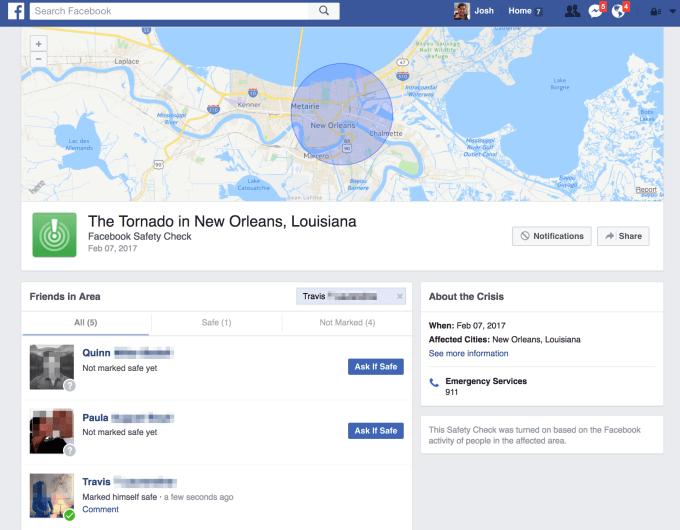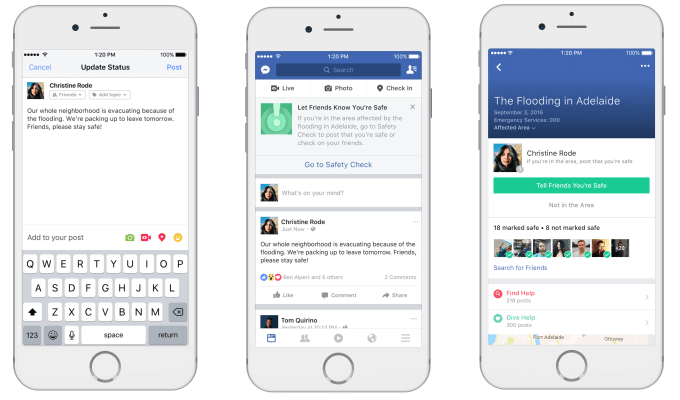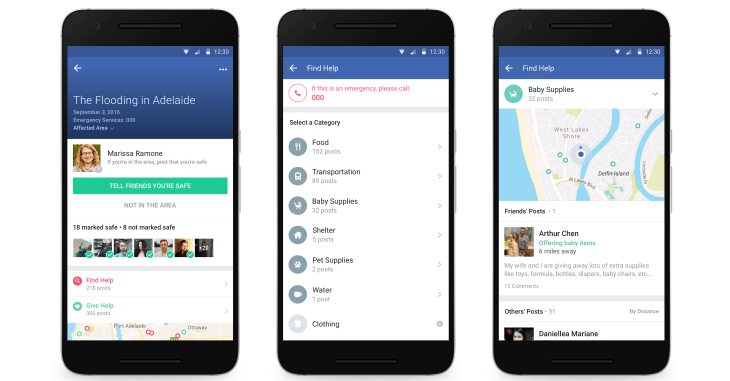Instead of sending thoughts and prayers to crisis victims, Facebook now lets you share food, transportation, and shelter. You know…things that will actually help. Today Facebook is expanding its Safety Check that allows friends to declare they’re safe after a disaster with the launch of “Community Help”.
The feature adds a page to Safety Check where locals can offer assistance to people nearby, such as baby supplies, water, or a room in their home. Victims can search through these categorized posts and connect with providers over Facebook Messenger. Community Help launches today in the US, Canada, Australia, New Zealand, India, and Saudi Arabia for natural and accidental disasters. After a few weeks of testing, Facebook hopes to roll it out to all countries and include purposeful man-made disasters such as terrorist attacks.
“We want to create a space on Facebook…that connects communities in the aftermath of a crisis and helps people feel safe faster, recover, and rebuild” says Facebook Safety Check product designer Preethi Chetan.
Facebook Gets Involved
Facebook first got involved in crisis safety back in 2011 with the distribution of Amber Alerts in its app that the company says have since helped rescue three kidnapped kids. After the ALS Ice Bucket Challenge went viral on Facebook video and raised $200 million, Facebook built the Donate button and fundraiser pages to make charitable giving easier. Facebook also added suicide prevention tools that offer resources to people who suspect a friend might be at risk for self-harm.
Meanwhile, Facebook noticed a trend around the 2011 Fukishima earthquake. People were using the social network to tell friends they were safe, so it developed the Disaster Message Board. After the 2013 Boston Marathon bombing, that product was evolved through one of Facebook’s internal hackathons to become Safety Check.

At the time, Facebook employees had to assess reports of crises themselves, trigger Safety Check manually, and select who could use it to mark themselves as safe. 4.1 million people used Safety Check after the Paris terror attacks. But to scale the product out, and make it respond faster with better accuracy, it needed to become more automated.
Yesterday during a press event in San Francisco, Facebook revealed how its streamlined Safety Check, reducing human involvement to just overseeing the feature for quality assurance.
It now receives verified alerts of crises from global reporting agencies NC4 and iJET International, giving the crisis a title and location while preventing fake news from becoming a Safety Check. Facebook then monitors for posts mentioning terms related to the disaster type in that area. If lots of people are posting about the situation nearby, Facebook Safety Check is automatically triggered, urging these users to mark themselves safe and ask nearby friends to do the same.
Look For The Helpers
Now, instead of Facebook’s crisis assistance ending there, it’s galvanizing local communities to support each other in tangible ways. Chetan’s team travelled to Chennai, India to watch how locals organized grass roots relief efforts through Facebook to learn what their product could do to make support simpler. The result was Community Help.
After users mark themselves safe, they’re shown a special page and feed related to the crisis. If they’re victims, they can post asking for help in one of around 10 categories including food, shelter, water, transportation, and pet supplies. Those in a position to help can then search this feed or post what they can offer, and get connected to victims over Messenger who can mark their requests as completed.

While this is the kind of assistance that was already happening through Facebook’s News Feeds and Groups, the company is taking extra precautions as it provides more organizational infrastructure. It includes stranger-danger tips to victims and providers, like that they should always meet in a public place, and research who they’re meeting ahead to make sure they look real and trustworthy. Brand new accounts or ones Facebook finds suspicious aren’t allowed on Community Help.
Hopefully Facebook will eventually link its charitable giving and crisis aid features to let people from afar contribute monetarily even if they can’t open their home or deliver necessities in person.
While social media has become a hub for grieving and information sharing in the wake of crises, much of the outpour of empathy goes unharnessed. Community Help could focus the human spirit towards making a real difference for victims that goes far beyond shallow clicktivism.
